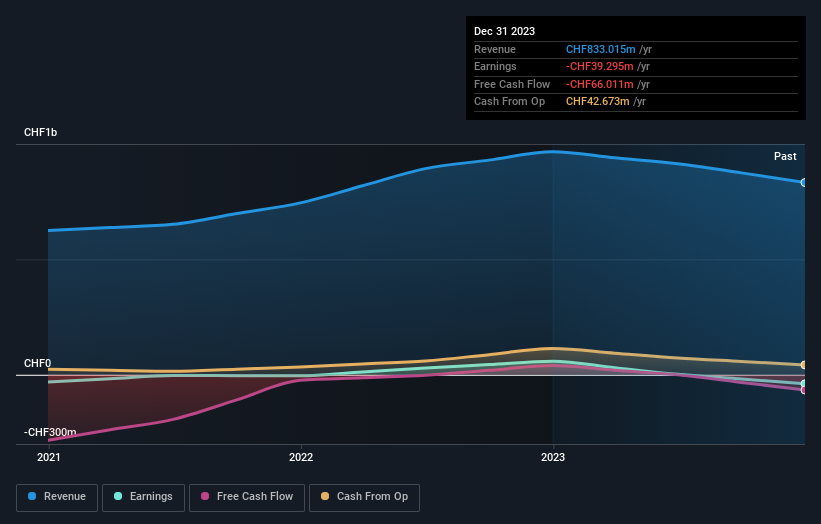Stock Analysis
- Switzerland
- /
- Healthcare Services
- /
- SWX:AEVS
Shareholders have faith in loss-making Aevis Victoria (VTX:AEVS) as stock climbs 4.9% in past week, taking five-year gain to 45%

Aevis Victoria SA (VTX:AEVS) shareholders might be concerned after seeing the share price drop 10% in the last quarter. On the bright side the share price is up over the last half decade. In that time, it is up 22%, which isn't bad, but is below the market return of 34%. Unfortunately not all shareholders will have held it for the long term, so spare a thought for those caught in the 18% decline over the last twelve months.
The past week has proven to be lucrative for Aevis Victoria investors, so let's see if fundamentals drove the company's five-year performance.
Check out our latest analysis for Aevis Victoria
Aevis Victoria wasn't profitable in the last twelve months, it is unlikely we'll see a strong correlation between its share price and its earnings per share (EPS). Arguably revenue is our next best option. Generally speaking, companies without profits are expected to grow revenue every year, and at a good clip. That's because it's hard to be confident a company will be sustainable if revenue growth is negligible, and it never makes a profit.
In the last 5 years Aevis Victoria saw its revenue grow at 11% per year. That's a fairly respectable growth rate. Revenue has been growing at a reasonable clip, so it's debatable whether the share price growth of 4% full reflects the underlying business growth. If revenue growth can maintain for long enough, it's likely profits will flow. There's no doubt that it can be difficult to value pre-profit companies.
You can see how earnings and revenue have changed over time in the image below (click on the chart to see the exact values).

If you are thinking of buying or selling Aevis Victoria stock, you should check out this FREE detailed report on its balance sheet.
What About The Total Shareholder Return (TSR)?
We've already covered Aevis Victoria's share price action, but we should also mention its total shareholder return (TSR). The TSR is a return calculation that accounts for the value of cash dividends (assuming that any dividend received was reinvested) and the calculated value of any discounted capital raisings and spin-offs. Its history of dividend payouts mean that Aevis Victoria's TSR of 45% over the last 5 years is better than the share price return.
A Different Perspective
We regret to report that Aevis Victoria shareholders are down 14% for the year. Unfortunately, that's worse than the broader market decline of 0.7%. Having said that, it's inevitable that some stocks will be oversold in a falling market. The key is to keep your eyes on the fundamental developments. On the bright side, long term shareholders have made money, with a gain of 8% per year over half a decade. It could be that the recent sell-off is an opportunity, so it may be worth checking the fundamental data for signs of a long term growth trend. I find it very interesting to look at share price over the long term as a proxy for business performance. But to truly gain insight, we need to consider other information, too. Case in point: We've spotted 2 warning signs for Aevis Victoria you should be aware of.
Of course Aevis Victoria may not be the best stock to buy. So you may wish to see this free collection of growth stocks.
Please note, the market returns quoted in this article reflect the market weighted average returns of stocks that currently trade on Swiss exchanges.
Valuation is complex, but we're helping make it simple.
Find out whether Aevis Victoria is potentially over or undervalued by checking out our comprehensive analysis, which includes fair value estimates, risks and warnings, dividends, insider transactions and financial health.
View the Free AnalysisHave feedback on this article? Concerned about the content? Get in touch with us directly. Alternatively, email editorial-team (at) simplywallst.com.
This article by Simply Wall St is general in nature. We provide commentary based on historical data and analyst forecasts only using an unbiased methodology and our articles are not intended to be financial advice. It does not constitute a recommendation to buy or sell any stock, and does not take account of your objectives, or your financial situation. We aim to bring you long-term focused analysis driven by fundamental data. Note that our analysis may not factor in the latest price-sensitive company announcements or qualitative material. Simply Wall St has no position in any stocks mentioned.
About SWX:AEVS
Aevis Victoria
Engages in healthcare, hospitality, lifestyle, and infrastructure sectors in Switzerland.
Overvalued with worrying balance sheet.


